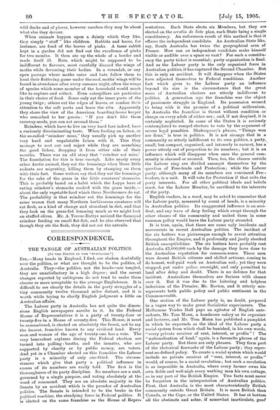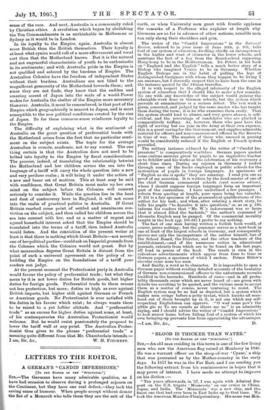SIR,—Many beads in England, I find, are shaken doubtfully over
the politics, or what are thought to be the politics, of Australia. They—the politics, not the heads—are tangled, they are unsatisfactory in a high degree ; and the recent changes reported by cablegram do not tend to make them clearer or more acceptable to the average Englishman. It is difficult to see clearly the details in the party struggles of a tiny community twelve thousand miles distant, and it is worth while trying to clarify English judgment a little on Australian affairs.
The Labour party in Australia has not quite the dimen- sions English newspapers ascribe to it. In the Federal House of Representatives it is a party of twenty-four or twenty-five in a House of seventy-five. This House, it must be remembered, is elected on absolutely the freest, not to say the loosest, franchise known to any civilised land. Every man and woman of the age of twenty-one has a vote. The very benevolent asylums during the Federal election are turned into polling - booths, and the inmates, who are supported by charity or by public money, are voters. And yet in a Chamber elected on this franchise the Labour party is a minority of only one-third. The circum- stances which give that party a political influence in excess of its numbers are easily told. The first is the thoroughness of its party discipline. Its members are a unit, governed by a single purpose, and voting absolutely at the word of command. They are an absolute majority in the Senate by an accident which is the paradox of Australian politics. The Senate is intended to be the brake in the !laical machine, the steadying force in Federal politics. It is 'elected on the same franchise as the House of Repre- sentatives. Each State elects six Members, but they are elected on the serutin de lists plan, each State being a single. constituency. An unforeseen result of this method is that it effaces the independent candidate. An Australian State like, say, South Australia has twice the geographical area of France. How can an independent candidate make himself. visible or audible over a space so vast P For such a-constitu- ency the party ticket is essential; party organisation is final. And as the Labour party is the only organised force in Australian politics, it has captured the Second Chamber. But this is only an accident. It will disappear when the States have adjusted themselves to Federal conditions. Another fact which gives to the Labour party an influence beyond its size is the circumstance that the great mass of Australian electors are utterly indifferent to politics. A generation ago the franchise was the object of passionate struggle in England. Its possession seemed to bring with it the promise of a political millennium. In Australia the franchise is thrust without condition .or charge on every adult of either sex ; and, if not despised, it is certainly neglected. In some of the States it is seriously contemplated to compel electors to vote by the argument of severe legal penalties. Shakespeare's phrase, "Things won are done," is true in politics. It is not strange that in a community so utterly indifferent to its own politics, a party, . small, but compact, organised, and intensely in earnest, has a power utterly out of proportion to its numbers ; but it is an influence which will disappear when once the general com- munity is alarmed or aroused. Then, too, the classes outside the Labour ring are divided amongst themselves by the question of Free-trade and Protection; while the Labour party, although many of its members are convinced Free- traders, is a unit. It will vote for Protection if that suits the party interests. For all other political ideals and beliefs must, for the Labour Member, be sacrificed to the interests of the party.
English readers, in a word, may be asked to remember that the Labour party, measured by count of heads, is a minority in Australian politics. Its exaggerated influence is an acci- dent, and any wave of deep feeling which swept through the other classes of the community and united them in some common policy would leave the Labour party stranded.
It is true, again, that there are some ugly incidents and movements in recent Australian politics. The incident of the six hatters was picturesque enough to arrest attention throughout the Empire, and it profoundly and justly shocked British susceptibilities. The six batters have probably cost Australia £1,000,000 each by the damage they have done to the Australian reputation for common-sense. These men were decent British citizens and skilled artisans, coming to do honest, well-paid work on Australian soil ; yet they were stopped, put under police oversight, and only permitted to land after delay and doubt. There is no- defence for that incident. Australians themselves are furious with shame over it. But it was due to the loitering and helpless indecision of the Premier, Mr. Barton, and it utterly mis- represents both public policy and public sentiment in the Commonwealth.
One section of the Labour party is, no doubt, prepared in a vague way to make great Socialistic experiments. The Melbourne Trades Hall pays an agitator of English ante- cedents, Mr. Tom Mann, a handsome salary as its organiser and lecturer, and Mr. Tom Mann has published a pamphlet in which he expounds as the ideal of the Labour party a social system from which shall be banished, in his own words, "every private receiver of rent, interest, or profits " ! The " nationalisation of land," again, is a favourite phrase of the Labour party. But these are only phrases. They form part of the rhetorical fireworks of the Labour party ; they repre- sent no defined policy. To create a social system which would include no private receiver of "rent, interest, or profits" would, of course, be a social revolution ; but such a revolution is as impossible in Australia, where every farmer owns his own fields and well-nigh every working man his own cottage, as in any part of the British Empire. Two facts must never be forgotten in the interpretation of Australian politics. First, that Australia is the most characteristically British community outside Great Britain, It is more British than Canada, or the Cape, or the United States. It has at bottom all the obstinate and sober, if somewhat inarticulate, gone
sense of the race. And next, Australia is a community ruled by Christian ethics. A revolution which began by abolishing the Ten Commandments is as unthinkable in Melbourne or Sydney as it would be in London. In its loyalty to the Empire, again, Australia is almost more British than the British themselves. Their loyalty is at least what cynics would call of a more effervescent and vocal sort than that the Motherland knows. But it is the natural and not ungraceful characteristic of youth to be enthusiastic in its sentiments ; and with Australia pride in the Empire is not qualified and sobered by the burdens of Empire. The Australian Colonies have the freedom of independent States without their burdens. Australians are not blind to the magnificent generosity of the Motherland towards them; and, since they are not fools, they know that the sudden and amazing ascent of Japan into the scale of a world-Power makes for Australia the shelter of the Empire more necessary than ever. Australia, it must be remembered, is that part of the Empire which geographically is nearest to Japan, and is most susceptible to the new political conditions created by the rise of Japan. So for them common-sense reinforces loyalty to the Empire.
The difficulty of explaining what is the sentiment of Australia on the great question of preferential trade with the Motherland arises from the fact that no particular senti- ment on the subject exists. The topic for the average Australian is remote, academic, not to say unreal. The one thing certain is that the Australian does not need to be bribed into loyalty to the Empire by fiscal considerations. The process, indeed, of translating the relationship betwixt the Motherland and her children across the sea into the language of a tariff will carry the whole question into a new and very perilous realm ; it will bring it under the action of a new and baser set of motives. This at least may be said with confidence, that Great Britain must make up her own mind on the subject before the Colonies will consent seriously to consider it. While the question lies in the heat and- dust of controversy here in England, it will not come into the realm of practical politics in Australia. If Great Britain reached some point of settled and unanimous con- viction on the subject, and then called her children across the sea into counsel with her, and as a matter of urgent and agreed household interest asked that the Empire should be translated into the terms of a tariff, then indeed Australia would listen. And the conviction of the present writer at least is that there is nothing which Great Britain—not merely one of her political parties—could ask on Imperial grounds from the Colonies which the Colonies would not grant. But by what measureless degrees Great Britain is distant from the point of such a universal agreement on the policy of re- building the Empire on the foundations of a tariff your readers can judge.
At the present moment the Protectionist party in Australia would favour the policy of preferential trade ; but what they mean by it is not lower duties for British goods, but higher duties for foreign goods. Preferential trade to them means not less protection, but more ; duties as high as ever against British imports, but higher still against German or French or American goods. No Protectionist is ever satisfied with the duties in his favour which exist ; he always wants them to be 'raised to a yet loftier altitude. And "preferential trade" as an excuse for higher duties against some, at least, of his contemporaries the Australian Protectionist would welcome. But he would resist passionately the proposal to lower the tariff wall at any point. The Australian Protec- tionist thus gives to the phrase "preferential trade" a meaning quite different from that Mr. Chamberlain intends.—
I am, Sir, &c., W. H. FITCHETT.







































 Previous page
Previous page